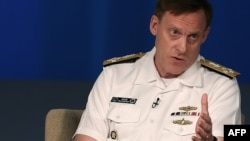The United States must create a framework for mass data collection that can quickly yield insights while still protecting citizens’ privacy, the nation’s cyber chief said Monday.
Michael Rogers, who heads both the National Security Agency and the U.S. Cyber Command, said such a framework is vital to identifying and heading off terrorist activities.
"What concerns me the most is timely access to data, because if we are going to generate outcomes in a process that takes weeks and months, it doesn't really generate the kind of value we need," said Rogers, a U.S. Navy admiral.
"We need to come up with a process that lets us generate insights and access the data in a much quicker time frame," he was quoted by AFP.
Rogers’ comments, at a cybersecurity forum at the George Washington University in Washington, were his first since a federal appeals court ruled last Thursday that NSA's bulk collection of telephone records is illegal.
The ruling adds urgency to congressional reforms of surveillance undertaken through the Patriot Act, legislation set to expires June 1. The massive surveillance effort, exposed by former NSA contractor Edward Snowden, also has angered some of America’s European allies who were subjected to scrutiny.
Last month, Senate Majority Leader Mitch McConnell introduced a bill that would extend the controversial surveillance authority through 2020. Proponents believe the screening enables the discovery of potential terrorist activity.
President Barack Obama has proposed that the government no longer collect telephone records, but that the records should be held by private telephone companies. The government would be able to query individual phone numbers upon the order of a special court.
"It just can't be the government doing this all by itself" because the number of threats has never been greater, Rogers said. "Cyber is a great equalizer ... to achieve capability in cyber doesn't take billions of dollars."
There’s no easy answer to balancing rights versus safety, the NSA chief said. "Information is increasingly becoming a weapon ... leading to a loss of life."
He also called for more sharing of information between government and industry about cybersecurity threats.




